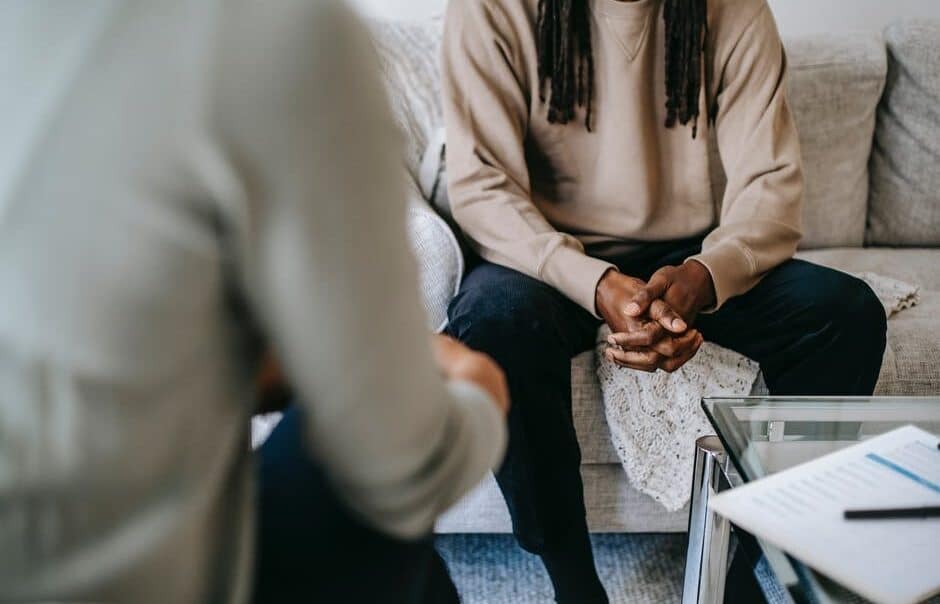
Learning to be Vulnerable with Your Therapist
Have you tried therapy before but felt it was not helping you? Did you find it hard to connect with your therapist and, in turn, could not fully open up? Learning to be vulnerable with your therapist is vital if you hope to reap the benefits of therapy.
Struggling to open up with a stranger, regardless of their credentials, is challenging for many. However, stereotypically, some men have more trouble learning to be vulnerable with others and opening up about their feelings and experiences. This is especially true when it comes to their mental health.
For decades, male stereotypes have taught us that, as men, we must always be strong and hide our feelings. These stereotypes are unrealistic. We are human, and being human comes with a messy mix of emotions.
To fully experience the benefits of therapy for mental illness or addiction, you must learn to be vulnerable, no matter how uncomfortable it may feel initially. Healing Pines Recovery can help you do that.
Benefits of Therapy for Mental Health and Addiction Treatment
Before diving into why it is important to be vulnerable with your therapist, let’s discuss the benefits of therapy for your mental health and addiction treatment. For starters, the number of treatment options available is endless. Two of the most common behavioral therapies implemented in addiction treatment are cognitive-behavioral therapy (CBT) and dialectical behavior therapy (DBT).
CBT helps patients struggling with addiction and several co-occurring disorders, like anxiety and depression. Its primary focus is to teach individuals how to control their thoughts, feelings, and behaviors. This helps clients learn and develop practical ways to modify harmful behaviors.
DBT is a psychotherapy in the same family as CBT. However, DBT helps clients focus on regulating their intense emotions. It focuses on acceptance and change and teaches mindfulness skills, coping techniques, distress tolerance, and, as mentioned, emotional regulation.
Most clients looking to improve their lives can benefit from these and other forms of therapy. Past traumas typically play a significant role in the development of addiction and mental illnesses. Therapy can help clients work through that trauma. Additionally, therapy will:
- Help you manage symptoms of addiction and mental illness
- Make long-term lifestyle changes that help you sustain sobriety
- Teach you healthy coping skills, preventing substance use or relapse
- Improve communication skills and relationships
- Help you identify triggers
These are just a few benefits you can reap through therapy, but first, you must learn to be vulnerable.
Why Learning to Be Vulnerable Is Important
Vulnerability is vital in therapy for several reasons. The more vulnerable you are, the more open you will be about your emotions. Therapists are only as effective as the information they receive. If you are not honest with your therapist, you limit their ability to help you. The more you keep to yourself, the less help therapy can be, and the more frustrated you will grow. You may even begin to lose faith in the process.
Learning to be vulnerable is not easy. As mentioned, men face all kinds of stereotypes that may make it difficult for them to open up, especially with a stranger. Aside from these stereotypes, opening up is challenging alone. Discussing what you consider the deepest, darkest parts of yourself is not a walk in the park. You can start slow, though. Slowly but surely, you can begin learning to be vulnerable with your therapist.
How Can You Start Learning to Be Vulnerable with Your Therapist?
Before you start being vulnerable with a therapist, you must first feel a connection with them. That is not always easy to do. Some people go through a few therapists before finding one they click with. Establishing a relationship between you and a therapist is vital and has more positive outcomes. A therapist utilizes initial therapy sessions to get to know you, better understand your problems, and create a connection.
In the first few sessions, your therapist will create a plan that addresses your issues and tracks your progress. After a couple of initial visits, the real work can begin, which will require some vulnerability. Another reason you may struggle with being open is that you do not want anything you say to be repeated outside a therapy session. Take comfort in knowing that therapists are legally and ethically obligated to maintain confidentiality for each client.
Specific Steps to Take
You can start being more vulnerable with your therapist by doing the following:
- Starting out small. Before worrying about vulnerability, just become comfortable talking with your therapist. Discuss the small things. Over time, you’ll become comfortable talking about more significant concerns.
- Prepare for therapy sessions. Consider journaling throughout the week and bringing that journal with you. Instead of trying to remember what your week was like, you’ll have documentation right there.
- Be honest. Tell your therapist you have concerns about being open and vulnerable with them.
- Get feedback from peers. Talk to your trusted peers if you are in recovery or a treatment program. Chances are you’re not the first guy to struggle with this.
- Manage your expectations. Therapy is not a cure and takes time. Remind yourself of this to manage your expectations more accurately.
Consider these tips and try learning to be more vulnerable with your therapist today.
Are you struggling with addiction or mental illness but weary about trying therapy? Maybe you have tried therapy in the past but didn’t think it helped. If that is the case, ask yourself if you were open and honest with your therapist. Therapy is only as helpful as you allow it to be. For a therapist to help you, they must get to know you and your situation. That requires you to be vulnerable, which is not always easy, especially for men. At Healing Pines Recovery, our customized approach helps men learn how to be more vulnerable with their therapist to improve their mental health and enhance their recovery. Call us at (720) 575-2621 today.
Paul Leafstedt
Paul was born and raised in the beautiful state of Colorado. He went to college in California at CAL Poly Pomona, majoring in Mechanical Engineering. Being a person in recovery and always finding fulfillment in helping others succeed, Paul co-founded a treatment center in California with 4 other partners. Paul came back to Colorado to continue his journey in the field of addiction, and to share his vision for Healing Pines Recovery. “Colorado is such a magical place for me, its natural beauty and peace lend itself for the perfect environment to connect with yourself and others. Healing Pines is different, it’s real, you can feel it. What you see is what you get here. This is a safe place to dig deep and be vulnerable, to re-discover yourself, what the world has to offer and what you have to offer the world.”Begin Your Journey & Escape Addiction
The first step can be the hardest. Fill out the form or call us at (720) 575-2621. You will be connected with a Healing Pines Recovery specialist who can answer your questions and help you get started.
Let Us Help You
Speak to Someone Right Now







